Saturday, January 31, 2004
A bit more on George AWOL Bush: Via Democratic Veteran, we went to Bolo Boffin who has a post that goes into some detail about Bush's final two years of Guard Duty - specifically, something called a Statements for Points Earned.
posted by Quiddity at 1/31/2004 03:42:00 PM
0 comments
Visualizing Talking Points Memo: Josh Marshall has written a guide to the current situation regarding WMD: Who claimed what, who was wrong, what should be investigated. In particular, he notes that in the key areas of nuclear weapons and ties to al Qaeda - without which war would have been a very hard sell - it was the White House and not the intel agencies that made "mistakes". There were mistakes made all around, but on the significant issue of war-justifying-arguments, it's pretty much a pure White House responsibility. In any event, we felt compelled to cook up a diagram to represent the situation. 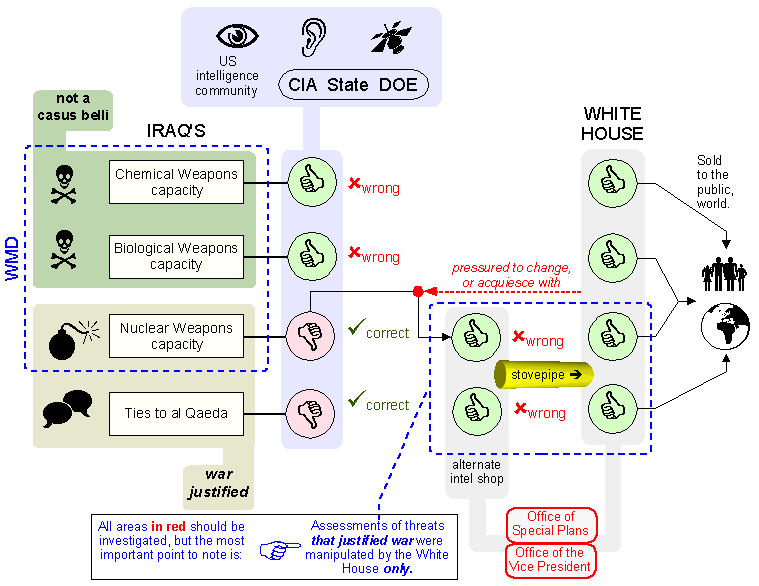 posted by Quiddity at 1/31/2004 01:25:00 PM
posted by Quiddity at 1/31/2004 01:25:00 PM
0 comments
Friday, January 30, 2004
"Has happened" ? We read in the New York Times story, Debate Over Iraqi Arms Poses Risk to President: (emphasis added) One White House official said Thursday that there was clearly a risk that an inquiry [into the erroneous WMD claims] could spin out of control, exactly what many administration officials fear has happened to the inquiry into the Sept. 11 attacks. To repeat: Has happened? Are there some surprises in store for us as that inquiry moves forward - and when it issues its report? Stay tuned.
posted by Quiddity at 1/30/2004 05:06:00 AM
0 comments
Thursday, January 29, 2004
What a friggin' moron! Stealing from Jack O'Tool and from Crooked Timber's Ted, we read that Andrew Sullivan has written the following: (emphasis added) SPOT THE MISSING PIECE: Josh Marshall has written an engaging and artful essay about the notion of an American empire for the liberal New Yorker magazine. I read it yesterday and then re-read it. Josh manages to write about the Clinton era "soft-imperialism" and the Bush era "hard imperialism" with nary a mention of a certain even that occurred on September 11, 2001. Maybe I missed something. I doubt if his editors noticed the lacuna. Why should they? For the Clintonites, 9/11 didn't really happen. Everything the Bush administration has tried to do in foreign policy is perverse, neocon imperialism - despite the fact that Bush ran as less interventionist than Al Gore in 2000. It doesn't seem to have occurred to them that this administration's hard line against terror-sponsoring regimes and those developing WMDs was not some ideological plot - but a reaction to events. It's important to remember that Marshall isn't some namby-pamby dove. In contrast to many Democrats, he takes national security issues seriously, and is not averse to the use of force. At one point, he even seemed to favor action against Saddam, until it appeared it couldn't be accomplished under perfect and optimal circumstances. After that, he deferred to president Jacques Chirac. So if Marshall hasn't noticed 9/11, what chance is there that the rest of the Democratic foreign policy establishment has? Look, I know I've been critical of the president's domestic shortcomings recently. But in the larger choice in this war there really isn't a choice. It's self-defense or winging it. When the consequences of winging it could be a biological/chemical/nuclear catastrophe in one of our cities, I'm not sure we have any real option but Bush.
- 12:13:48 AM Josh Marshall wrote in his essay: After September 11th, a left-wing accusation became a right-wing aspiration: conservatives increasingly began to espouse a world view that was unapologetically imperialist. We've often checked stories for specific words, and to be sure of our facts we will search the text when appropriate. Sullivan apparently didn't have the time to do the following: (with Microsoft's Internet Explorer, but other browsers have similar capabilities) Edit / Find on this page / "11" / Find Next Which would have resulted in this: 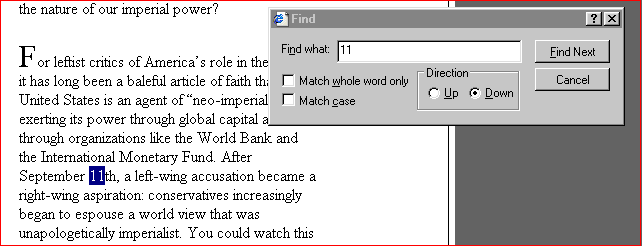
Re Sullivan's "Maybe I missed something.": Maybe you're a partisan hack. Maybe you insert qualifiers so that you can slime somebody, yet have an out should you be called to account.
posted by Quiddity at 1/29/2004 01:57:00 PM
0 comments
Headlines: 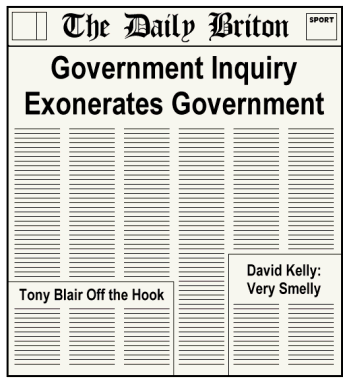
posted by Quiddity at 1/29/2004 06:54:00 AM
1 comments
Wednesday, January 28, 2004
In search of the Ur-text: The Washington Post has an editorial that makes light of the current jobless situation. Many in the blogosphere have attacked it, including Brad DeLong. As bad as the editorial is, we did a little textual criticism and it sure looks like a rewrite of an unpleasant Robert Samuelson column of 14 January, The Specter of Outsourcing. In the Post editorial, we read: If a U.S. firm shifts employment abroad, the savings flow back to the United States in the form of lower prices for consumers and higher dividends for shareholders; the consumers and shareholders will direct their new spending power at things that create employment. Samuelson, two weeks earlier: Cheap foreign labor has threatened individual U.S. workers but not the economy as a whole.
The reason is that imports also create gains. Despite job losses, consumers or companies gain. Lower prices boost purchasing power or profits. That creates more demand at home. Consumers can spend more; businesses can invest more. Samuelson - the man behind the curtain.
posted by Quiddity at 1/28/2004 10:44:00 AM
0 comments
Glaring error by Bush missed by the august New York Times: The New York Times has a story today, entitled: Bush Backs Away From His Claims About Iraq Arms, but nowhere in that story is this quote by the president: Well, I think the Iraq Survey Group must do its work. Again, I appreciate David Kay's contribution. I said in the run-up to the war against Iraq that -- first of all, I hoped the international community would take care of him. I was hoping the United Nations would enforce its resolutions, one of many. And then we went to the United Nations, of course, and got an overwhelming resolution -- 1441 -- unanimous resolution, that said to Saddam, you must disclose and destroy your weapons programs, which obviously meant the world felt he had such programs. He chose defiance. It was his choice to make, and he did not let us in. Nobody seems to care - at least at the extremely liberal New York Times - that Bush is wrong about that. Weapons inspectors were crawling all over the country in early 2003. Like Mel Brooks said, "It's good to be the king."
posted by Quiddity at 1/28/2004 10:07:00 AM
0 comments
Monday, January 26, 2004
A good line: Heard on Harry Shearer's Le Show this Sunday: Where there's smoke, there's fire-related program activities.
posted by Quiddity at 1/26/2004 02:16:00 AM
0 comments
Ignorance is bliss? 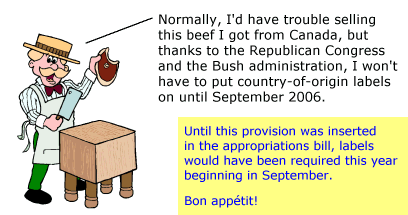 posted by Quiddity at 1/26/2004 01:21:00 AM
posted by Quiddity at 1/26/2004 01:21:00 AM
0 comments
Friday, January 23, 2004
"Not supported by the facts" - NOT! From the New Hampshire Democratic debate: ( transcript) JENNINGS: General Clark, a lot of people say they don't you well, so this is really a simple question about knowing a man by his friends. The other day you had a rally here, and one of the men who stood up to endorse you is the controversial filmmaker Michael Moore. You said you were delighted with him.
At one point, Mr. Moore said, in front of you, that President Bush -- he's saying he'd like to see you, the general, and President Bush, who he called a "deserter."
Now, that's a reckless charge not supported by the facts. And I was curious to know why you didn't contradict him, and whether or not you think it would've been a better example of ethical behavior to have done so.
CLARK: Well, I think Michael Moore has the right to say whatever he feels about this.
CLARK: I don't know whether this is supported by the facts or not. I've never looked at it. I've seen this charge bandied about a lot. Not supported by the facts? Bush was definitely AWOL (absent under 30 days) and most likely a "deserter" (absent more than 30 days). For those interested, check out our table that chronicles Bush's service (or lack therof) in the Texas Air National Guard. Note the several-month period (June, July, August 1972) when he was away from the base without permission.
posted by Quiddity at 1/23/2004 06:53:00 AM
0 comments
Grow up!  (The first line was part of the 2004 State of the Union speech.)
posted by Quiddity at 1/23/2004 04:31:00 AM
0 comments
Thursday, January 22, 2004
Today's big story: Diagram derived from the Boston Globe's Senate panel's GOP staff pried on Democrats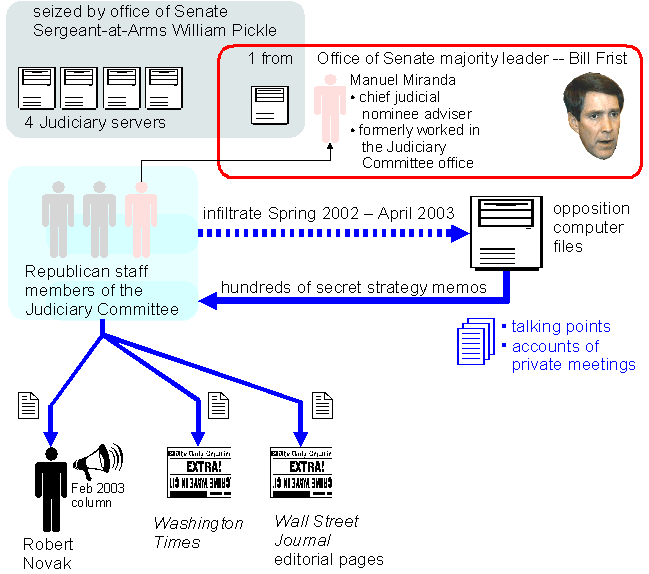 posted by Quiddity at 1/22/2004 12:21:00 PM
posted by Quiddity at 1/22/2004 12:21:00 PM
0 comments
Wednesday, January 21, 2004
Trying to figure it out: From the 2004 SOTU: Already, the Kay Report identified dozens of weapons of mass destruction-related program activities 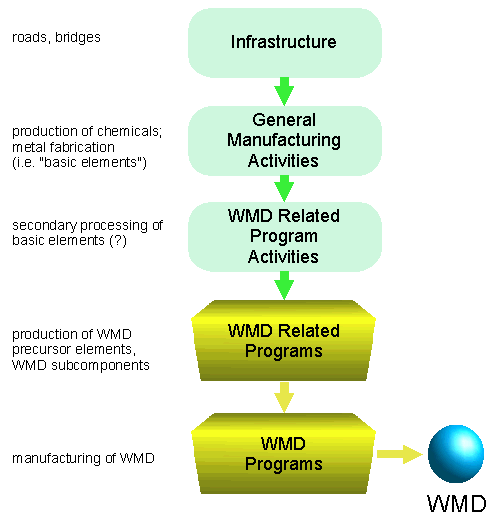 posted by Quiddity at 1/21/2004 09:54:00 PM
posted by Quiddity at 1/21/2004 09:54:00 PM
0 comments
What a difference a year makes! 2003 State of the Union speech: words spoken about Saddam's WMD = 1197 (out of 5413 = 22.1%) 2004 State of the Union speech: words spoken about Saddam's WMD = 86 (out of 5279 = 1.6%)
posted by Quiddity at 1/21/2004 07:24:00 PM
0 comments
ADMINISTRATIVE UPDATE: We are experiencing a problem (again) with disappearing directories/files that we use to host images. We are working to resolve the issue.
posted by Quiddity at 1/21/2004 10:04:00 AM
0 comments
Living in oxymoronic times: We like Troubletown this week.
posted by Quiddity at 1/21/2004 09:38:00 AM
0 comments
2004 State of the Union speech - by the numbers: | subject | words | | opening remarks | 308 | | WOT: general | 86 | | WOT: Patriot/tracking down | 288 | | WOT: Taliban/al Qaeda, Afghn. | 105 | | Iraq: Saddam | 162 | | Iraq: rebuild | 200 | | WOT: Libya, N.Korea | 169 | | WOT: general | 335 | | WOT: international relat. | 303 | | WOT: WMD | 86 | | Middle East, democracy | 217 | | WOT: wrap-up | 74 | | Taxes | 168 | | New skills, NCLB | 476 | | Taxes | 121 | | Lawsuits, energy, Social Sec. | 131 | | Budget | 85 | | Immigration | 138 | | Medicare | 309 | | Healthcare (misc) | 204 | | Values | 84 | | Children / drugs | 177 | | steroids | 100 | | Children / abstinence | 138 | | Marriage | 184 | | Faith-based | 114 | | prisoner re-entry | 142 | | letter from Ashley | 283 | | closing remarks | 92 |  posted by Quiddity at 1/21/2004 01:48:00 AM
posted by Quiddity at 1/21/2004 01:48:00 AM
0 comments
Tuesday, January 20, 2004
Parallels: Then: The Rise and Fall of the Third Reich by William L. Shirer pages 471-475
HITLER'S REPLY TO ROOSEVELT (must be registered w/Amazon to view page)
Hitler got to the core of his answer to the President's request that he give assurances not to attack any of thirty-one nations."How has Mr. Roosevelt learned which nations consider themselves threatened by German policy and which to not? Or is Mr. Roosevelt in a position, in spite of the enormous amount of work which must rest upon him in his own country, to recognize of his own accord all these inner spiritual and mental impressions of other peoples and their governments?
Finally, Mr. Roosevelt asks that assurances be given him that the German armed forces will not attack, and above all, not invade the territory or possessions of the following independent nations ..." Hitler then read out slowly the name of each country and as he intoned the names, I remember, the laughter in the Reichstag grew. Now: George W. Bush's State of the Union Address of 20 January 2004"Some critics have said our duties in Iraq must be internationalized. This particular criticism is hard to explain to our partners in Britain, Australia, Japan, South Korea, the Philippines, Thailand, Italy, Spain, Poland, Denmark, Hungary, Bulgaria, Ukraine, Romania, the Netherlands, (cheering) Norway, El Salvador, and the 17 other countries that have committed troops to Iraq. " COMMENTARY: We were listening to the speech and early on thought that it was martial in spirit - even bellicose. In fact, it seemed similar to the sort of speech that a Hitler or a Kruschev might deliver. Then, to our immense surprise, Bush read out - slowly - a list of countries to make a point. This was very much like the well known episode where Hitler read out a list of countries in a speech in the Reichstag. (That speech, on 28 April 1939 is often shown in World War Two documentaries because it shows the Fuhrer in a rare lighthearted moment.) Now, we're not saying Bush is Hitler, but we cannot help but wonder what the speechwriter was thinking when that country-list was included - because even if most Americans aren't aware of the parallel, many others throughout the world (and especially in Europe) will not miss the eerie parallel.
posted by Quiddity at 1/20/2004 07:39:00 PM
0 comments
Monday, January 19, 2004
A cartoonist to check out: We recently discovered a cartoonist with a political bent - Fighting Words by No Mind - who can be viewed here. We completely missed out on the timeliness of the Pickering nomination, but No Mind got it.
posted by Quiddity at 1/19/2004 03:37:00 AM
0 comments
The president speaks: From his remarks of 7 January 2004: If an American employer is offering a job that American citizens are not willing to take, we ought to welcome into our country a person who will fill that job. Deconstruct: - WHO IS BEING HELPED?
If an American employer is offering a job that American citizens are not willing to take, we ought to welcome into our country a person who will fill that job.
- WHO IS NOT BEING HELPED?
If an American employer is offering a job that American citizens are not willing to take, we ought to welcome into our country a person who will fill that job.
- WHAT IS THE POINT OF ISSUE?
If an American employer is offering a job that American citizens are not willing to take, we ought to welcome into our country a person who will fill that job.
- WHAT IS ANOTHER WAY OF DESCRIBING IT?
If an American employer is offering a crummy job, we ought to welcome into our country a person who will fill that job.
- INSTEAD OF ALLOWING THE CITIZEN WORK-FORCE TO USE ITS ECONOMIC POWER IN NEGOTIATING FOR A GOOD JOB, BUSH SAYS:
If an American employer is offering a crummy job, we ought to welcome into our country a person who will fill that job.
SUMMARY: Bush is proposing a program that deprives American workers economic power by allowing businesses to bring in anybody to work at dirt-cheap rates. Can anything be more clear?
posted by Quiddity at 1/19/2004 03:19:00 AM
0 comments
Friday, January 16, 2004
No sensible reason for this post: Went to NBC to check out what Meet the Press had scheduled. Noticed the beady-eyed Russert - staring out. Staring out at all of us. Staring. Almost like a hypnotist. 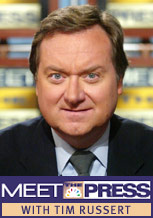 So, why not jazz it up and turn it into a spooky image?  posted by Quiddity at 1/16/2004 02:22:00 PM
posted by Quiddity at 1/16/2004 02:22:00 PM
0 comments
Wednesday, January 14, 2004
Tinfoil hat time? We have been interested in Kevin Phillips new book, American Dynasty: Aristocracy, Fortune and the Politics of Deceit in the House of Bush, and so we read several news items related to his book. From the links provided by cursor.org, we examined: Kevin Phillips Op-Ed in the Los Angeles TimesA book review in the Washington Post (via Just a Bump in the Beltway) The excerpt provided by Barnes & Noble And an interview with Phillips on Democracy Now There's a lot of information and it spans much time and space. Still, we tried to put together most of the moving parts (as Josh Marshall would say) into a single diagram. 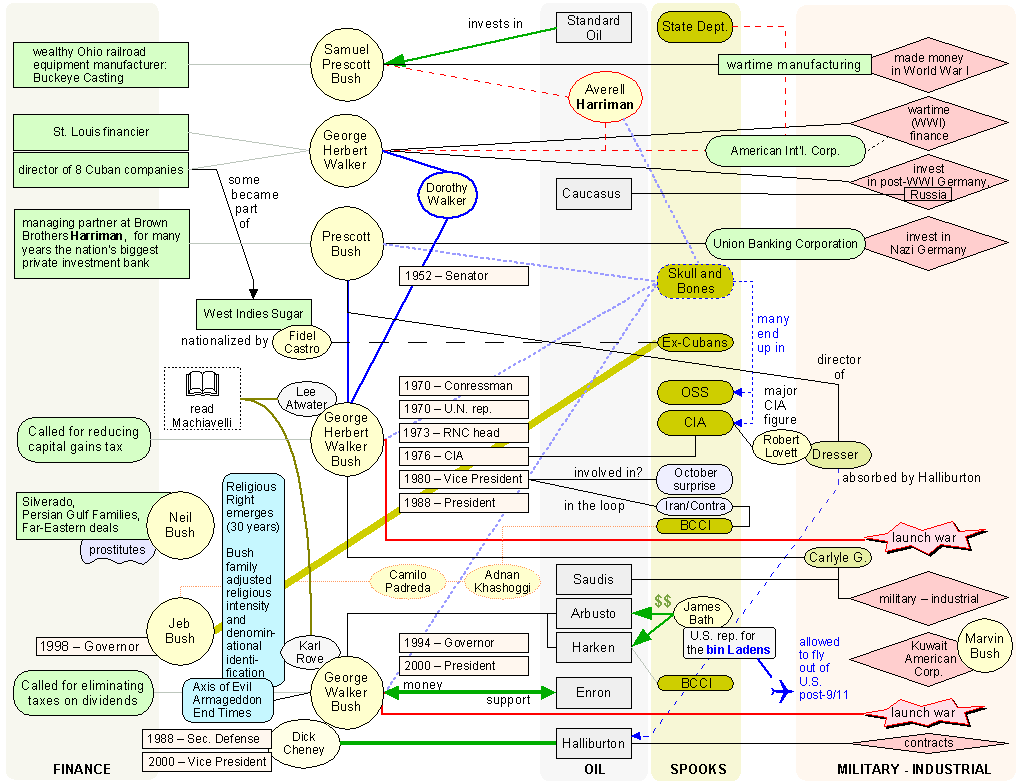 NOTE: We might include more details about the Bush family connections to the Saudis/Middle-East-characters/offshore-oil-projects at a later date. Our opinion? Too early to say. Lots of things look connected and conspiratorial, but in life there are lots of connections. However, Phillips does seem to be onto something when he posits a big sticky ball of spooks, oil-interests, foreign intrigue, and politics - with the Bush family well integrated into it. We recommend you read the essays and interviews about the book so that you can form your own opinion. We hope this diagram will be an aid in understanding the elements and theories that Kevin Phillips has written about. ADMINISTRATIVE NOTE: We are having some problems with image hosting (a directory keeps disappearing) and so the URL for the image might change over the next few days - hopefully still allowing visitors to see the damn thing.) PRINTING / FORMAT UPDATE: For those who are having trouble viewing (and printing) the image above, we have a smaller-sized diagram that you can view here (and print it in landscape)
posted by Quiddity at 1/14/2004 04:58:00 PM
1 comments
Basic English: plan - noun - a detailed formulation of a program of action Did the Clinton administration have a plan (filed away somewhere) for toppling Saddam Hussein?Yes. Did the Bush administration have a plan for toppling Saddam Hussein?Yes. plan - verb - to have as a specific aim or purpose; intend: They plan to buy a house. Did the Clinton administration plan to topple Saddam Hussein?No. Did the Bush administration plan to topple Saddam Hussein?Yes, as early as the first weeks of Bush's term (according to Paul O'Neill). Conservative pundits would have you believe that there was no difference between Clinton and Bush because they each had a plan (the noun) for toppling Hussein. But the difference is that Clinton did not plan (the verb) to do it. Bush did - right from the start, prior to 9/11 - and the wisdom of that is what is at question.
posted by Quiddity at 1/14/2004 08:14:00 AM
0 comments
Point - Counterpoint: Richard Perle and David Frum wrote a book, An End to Evil. The New York Times reviewed it. Excerpt from the review: (emphasis added) [The book contains] triumphalist boasts ("the United States has become the greatest of all great powers in world history"), their macho posturing and their willful, flame-throwing language. "There is no middle way for Americans," they write in the opening chapter. "It is victory or holocaust. This book is a manual for victory."
[Perle and Frum] declare that "when it is in our power and our interest, we should toss dictators aside with no more compunction than a police sharpshooter feels when he downs a hostage-taker." Of the United Nations, another one of their nemeses, they write, "The U.N. regularly broadcasts a spectacle as dishonest and morally deadening as a Stalinist show trial, a televised ritual of condemnation that inflames hatreds and sustains quarrels that might otherwise fade away."
Mr. Perle and Mr. Frum argue that America "should force European governments to choose between Paris and Washington," and they assert that Iran is "the world's least trustworthy regime," ominously adding, "The regime must go."
Throughout "An End to Evil" they purvey a worldview of us-versus-them, all-or-nothing, either-or, and this outlook results in a refusal to countenance the possibility that people who do not share the authors' views about the war in Iraq or their faith in a pre-emptive, unilateralist foreign policy might have legitimate reasons for doing so. Instead, Mr. Frum and Mr. Perle accuse those who differ with their foreign-policy beliefs of failing to support the war against terrorism: of being cowardly, delusional or defeatist. Wild.
posted by Quiddity at 1/14/2004 07:27:00 AM
0 comments
Tuesday, January 13, 2004
Campaign 2004:  posted by Quiddity at 1/13/2004 02:53:00 PM
posted by Quiddity at 1/13/2004 02:53:00 PM
0 comments
Al Franken watch: Last week ( Tuesday, 6 January) he was on NPR's Fresh Air discussing his 8-day USO tour in December that had him visiting Afghanistan, Kuwait, and Iraq. It was Franken's fourth USO tour in five years, which would seem to make him a bigger patriot than windbag Bill O'Reilly. Has O'Reilly ever entertained the troops? Is it possible for O'Reilly to entertain (as opposed to bloviate)? This Tuesday, Al Franken will be on the Charlie Rose Show for the entire hour. Should be interesting and amusing.
posted by Quiddity at 1/13/2004 09:17:00 AM
0 comments
Sunday, January 11, 2004
Observe the logic: Get this exchange on Fox News Sunday (11 Jan) between Chris Wallace and Mexico's Vicente Fox: WALLACE: One of the sorest issues was your opposition to the war in Iraq. Now, after Saddam Hussein's capture and seeing the U.S. trying to establish a democracy there, do you sometimes think that perhaps the president was right and that you were wrong?
FOX: No. No. I think that by different roads you can get to Rome.
The main purpose is to rescue Iraq from the dictator, and that was accomplished. Number two is to move Iraq into a democratic nation, a free nation, with citizens who start enjoying better opportunities to their own development.
And this route, it's working as well as maybe the other one could have worked.
WALLACE: Do you still think there was another way to deal with Saddam Hussein, though, short of invasion?
FOX: Well, I am not sure that we have to go back to the discussions and the positions then. But our position was very clear that multilateralism is a key issue on this 21st century, and it should be enhanced and developed to the better of all nations.
posted by Quiddity at 1/11/2004 08:34:00 PM
0 comments
Saturday, January 10, 2004
Frum and Perle - scary! David Frum and Richard Perle have a new book out called "An End to Evil" which calls for a radical change in U.S. policy. (Not that it hasn't been radical for the last year.) These guys are ... let's put it this way ... they are not "out of the loop", and clearly represent a segment of neocon thinking. David Brooks should read their book before penning more nonsense in the New York Times about neocons. Here are some highlights from their book as reported in the (anti-Semitic-according-to-Brooks) Forward: - ... Frum and Perle call for universal biometric fingerprinting ...
- [Frum and Perle call for] a complete reform of the State Department ...
- ... Frum and Perle advocate firing George Tenet, director of the CIA ...
- ... Frum and Perle advocate ... relieving the FBI of the "counter-terrorism job it has bungled."
- Frum and Perle argue that "we must destroy regimes implicated in anti-American terrorism," and provide a list of potential targets, including North Korea, Syria, Libya, Saudi Arabia and Iran. "We must move boldly against them. . . . And we don't have much time," they write.
- [Frum and Perle advocate] immediate steps to bring about regime change in Iran and Syria ...
- [Frum and Perle propose] a military blockade of North Korea ...
- [Frum and Perle argue] that "a more closely integrated Europe is no longer an unqualified American interest," and that America should actively try to drive a wedge between France and the rest of the continent.
Had enough? We watched the authors on the Charlie Rose show earlier this week, and boy, was it revealing. Here are our notes from the program: Perle - international law not sufficient to allow U.S. to go after a tyrant who abuses his people
Frum - Saddam a "charismatic extremist who gave hope to the people who hate the U.S." - therefore justified in taking him out
Perle - problems with State, CIA, FBI, (international) lawyers, UN
Perle - need to reform the military (due to technical advances), need to reform CIA
Frum - "It's not high-tech banditry [al Qaeda], it's a real war"
Perle - approves the use of threatening governments to obtain policy changes
Perle - on Saudi Arabia: "If you take the money away, the extremist groups are a tiny little fringe" [but that undercuts their Clash of Civilization theme.]
Frum - stop the money -> stop the terrorist(s) [also undercuts Clash of Civ.]
Perle - "Democracies don't make war" "wars are started by dictators who need wars to stay in power" (!)
Frum - reason reform of govt. agencies hasn't happened is not the problem of Bush or Republicans in congress, but due to "inertia"
Perle - on Syria: CIA far too eager to accept crumbs (of intel. help)
Perle - threat of terrorist attack [is equivalent to] threat of invasion across borders
Frum - U.N. can't be arbiter of when the U.S. is able to defend itself
Perle - U.N. can't be arbiter for any nation.
Perle - Saddam was a threat to our survival: hated US, had WMD, had used in past, had capacity to produce, on verge of getting out from under sanctions
Frum - the "debate about Iraq is behind us"
Frum - "terrorism is about lies; lies don't last"
posted by Quiddity at 1/10/2004 10:28:00 PM
0 comments
We haven't forgotten: He's been in the slammer four months now (out of a nine month sentence). Here's an update on the dude - a story that tells you about Tommy Chong, his family, how the authorities went after him, and what's he's doing now. Excerpt: ... it is a case of the Bush administration confusing the present with the 1960s, an era whose rebellious legacy it seems obsessed with obliterating. To Ashcroft and other Puritan Republicans, Tommy Chong’s prosecution is merely another skirmish in their implacable war against the 20th century. In this climate it becomes almost pointless to talk about the drug-war hypocrisy of a White House whose mortgage is owned by pharmaceutical monopolies. Or of the reverential treatment given the Oxy-popping Rush Limbaugh by neo-McCarthyites like Bill O’Reilly, who lyingly told a Jay Leno audience that Tommy Chong had been arrested 18 times.  posted by Quiddity at 1/10/2004 11:15:00 AM
posted by Quiddity at 1/10/2004 11:15:00 AM
1 comments
Tuesday, January 06, 2004
Seeing things our way: Readers of this weblog know our view is that al Qaeda is a menace, not a state power, and that Bush should have rounded these guys up in Tora Bora when the political and tactical opportunities existed (roughly from September 2001 - March 2002). Instead, the Bush administration has played defense (PATRIOT Act, airline security, Orange Alerts, fingerprinting visitors) in addition to using the terror threat to boost the military budget. It's almost as if an arsonist and his cronies were on the loose, and the response is to put more fire extinquishers in the house. But that's silly. You go and capture the arsonist. In any event, we are beginning to see opinions expressed that Bush's reaction to 9/11 was a missed opportinity, and a way to further other policy goals (most notably invading Iraq). We suspect that this (slowly growing) consensus is the result of time. Where are these al Qaeda guys? Where are the weapons caches? How come there hasn't been anything other than truck and car bombs - and in far away places? The answer might be that al Qaeda - dispite admiration from a segment of the Islamic world - is effectively 2,000 folks with a millionaire sugar daddy. (We hasten to point out that we could be wrong in this assessment, but our view at least deserves consideration in the debate since all evidence to date points to a less-than-impressive al Qaeda.) WIth that said, here are some excerpts from commentators about Bush's overall response to 9/11: James Carroll writing in the Boston Globe (via Random Walks)George W. Bush obscenely exploits war for his own purposes. He sponsors a paranoid assessment of what threatens America now and draws political advantage from the resulting fear. The news media propagate that fear. Pundits continue the false opposition between "realist" and "idealist" visions, marginalizing anyone who dares question Garrison America. Paul Krugman (get it before it becomes a pay-to-view-article)Most Democrats feel, with justification, that we're facing a national crisis — that the right, ruthlessly exploiting 9/11, is making a grab for total political dominance. George Soros, writing in The Atlantic (mostly about foreign/military policyThe terrorist attack on the United States could have been treated as a crime against humanity rather than an act of war. Treating it as a crime would have been more appropriate. ...
Declaring war on terrorism better suited the purposes of the Bush Administration, because it invoked military might; ....
The war on terrorism as pursued by the Bush Administration cannot be won. On the contrary, it may bring about a permanent state of war. Terrorists will never disappear. They will continue to provide a pretext for the pursuit of American supremacy.
posted by Quiddity at 1/06/2004 03:21:00 PM
0 comments
More on David Brooks: We discussed (two posts below) Brooks' essay that attempts to de-link neoconservatives and the Project for the New American Century from Bush's foreign policy. We only highlighted Brooks notion that Bush "formed conclusions on his own", thinking that was funny. However, his essay requires a further thrashing. To begin with, let's see how uninfluential PNAC is in the administration. Consider this diagram we published last February: 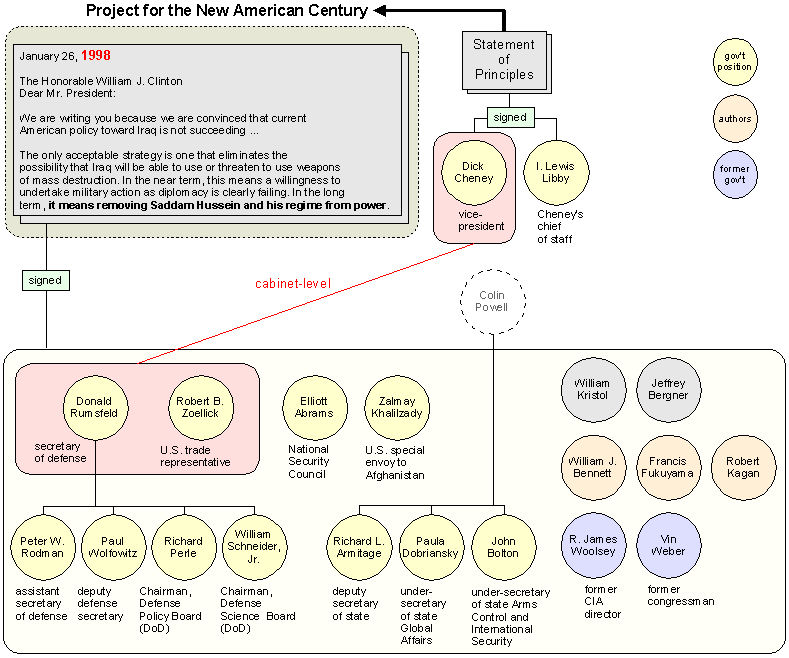 See? It was only the Vice President and Secretary of Defense who - with another 11 government officials - signed on to the PNAC agenda. Then, read Brooks. Then, read Howler's excellent discussion on Brooks (focusing on the anti-Semitic charge). Finally, if you are still with us, catch Josh Marshall's review of Brooks. Excerpts: We’ve now gone from arguments where anti-Semitism is perceived at the margins of critiques of neoconservative intellectuals to the current practice in which it is treated as a given that 'neoconservative' is simply a code word for Jew and criticisms of the same are one shade or another of anti-Semitism.
[Brooks] aim is to discredit any notion that neoconservatism plays any significant role in Bush administration foreign policy --- a demonstrably ridiculous point. Brooks does this by mixing in all sorts of code words about ‘conspiracies’, ‘jews’, radio communications through dental filings and the like to stigmatize as ridiculous what is actually a serious issue and ripe field for serious debate.
It’s almost the definition of anti-intellectualism. UPDATE: The original post had us writing about the V.P. and Secretary of State signing on to the PNAC agenda. Should have been Secretary of Defense. Thanks to SP and Mark for correcting us.
posted by Quiddity at 1/06/2004 11:14:00 AM
0 comments
David Horowitz - ignorant of history: In an Op-Ed piece in the Los Angeles Times - mostly bashing progressives - "scholar" Horowitz writes: The United States and Britain, which led the world in ending slavery ... Now Britain was a leader, but consider this timeline: 1821 The region that now includes Ecuador, Colombia, and Venezuela adopted a gradual emancipation plan.
1823 Chile agreed to emancipate its slaves.
1829 Mexico abolished slavery.
1833 Britain emancipated 780,000 slaves.
1848 Denmark and France freed slaves in their colonial empires.
1863 Dutch New World colonies abolished slavery.
1865 United States abolished slavery.
1886 Slaves emancipated in Cuba.
1888 Brazil abolished slavery.
posted by Quiddity at 1/06/2004 06:43:00 AM
0 comments
Joke of the day: David Brooks writes in the New York Times and dismisses charges that neoconservatives had much of a hand in shaping the administration's foreign policy (especially the invasion of Iraq). He says: It's true that both Bush and the people labeled neocons agree that Saddam Hussein represented a unique threat to world peace. But correlation does not mean causation. All evidence suggests that Bush formed his conclusions independently.
posted by Quiddity at 1/06/2004 06:18:00 AM
0 comments
Friday, January 02, 2004
Washington Week in Review tells you what not to think about: Last week (26 Dec 2003) PBS' Washington Week in Review had a year end round-up to examine the significant events of 2003. They covered four topics: Bush's foreign policy, Democratic presidential candidates, the economy, and domestic issues (Medicare, gay unions). We were surprised at the breezy treatment of Bush's foreign policy - which was mostly about the Iraq war. We reproduce the exchange on foreign policy below with the text highlighted in RED when the panel discussed Bush's unsupported claims of WMD and terrorist connections, and general mismanagement (e.g. disbanding the Iraqi army, Haliburton contracts). GWEN IFILL, host: Every year at this time, we take a look back, and we never fail to be shocked at how much has actually happened. So much this year centers on the war in Iraq. In September, nearly five months after the president declared major combat operations over, he was still evoking the memory of 9/11 and reassuring the American people that it was all worth it.President GEORGE W. BUSH: Two years ago, I told the Congress and the country that the war on terror would be a lengthy war, a different kind of war fought on many fronts in many places. Iraq is now the central front. Enemies of freedom are making a desperate stand there, and there they must be defeated. IFILL: So, Michael, looking back on this year, it becomes clear that George W. Bush staked his entire presidency on foreign policy.
Mr. MICHAEL DUFFY (Time Magazine, Washington Bureau Chief): Yeah, and it's also clear that the way the year ends with so many surprises, and the way it began with so much anxiety about how the war would turn out, we've learned that the president has discovered that he's got a lot more tools in his foreign policy toolbox at the end of the year than we thought he had at the beginning. And it may be that the use of war as an instrument of foreign policy has given him the confidence, may have given him the confidence to use some of these other tools they didn't even know they had. The--the invasion of Iraq is the signature event of the year. The president took a small coalition and a maximum foreign--you know, preemptive foreign policy overseas. He invaded the country. He tossed out the dis--dictator. And they're beginning the long, hard work of trying to, you know, rebuild the country physically and psychologically. And that's going to be the--what puts him in the history books for good or for ill. It's going to be what probably determines whether he's re-elected or not.
But we also learned that it's not the only--preemptive war is not the only tool the administration has discovered. This year, we saw them go take on North Korea in a different way than we had expected in the first year. They have begun to work multilateral negotiations with the North Koreans with countries we didn't--he wasn't thinking of before, Chinese, the Russians. And--and the same what happened last week with Libya, something of a surprise, secret negotiations, bilateral negotiations. So we've disc--one of the things that I think we've--one of the things he has learned or they have learned and we've seen is that they realize now there are lots of different ways to skin these cats if weapons of mass destruction is what you're worried about.
Mr. ALAN MURRAY (CNBC Washington Bureau Chief): Yeah, I mean, Libya happened late at night. It didn't get--on a Friday night, not too late. You cut it on your show, I'm sure, but...
IFILL: Yes, we did.
Mr. MURRAY: But it didn't get as much attention as it might have if it had happened earlier. But if invading Iraq means that you have more leverage in dealing with Libya, in dealing with North Korea, in dealing with Iran, then history will look at this in a very different way than people are--have been looking at it this year.
Mr. DUFFY: All right. They didn't think of that when they started thinking about invading Iraq. That may be--this may be a byproduct even they didn't anticipate. But then, there's no question that there are things about the whole Iraqi invasion that are far from cleaned up yet. I mean, they--you know, they're going to have a long year still, maybe several years, putting this country back together. The--the clean-up work is huge. They still haven't figured out how they're going to organize this government. The Iraqis haven't figured out how they're going to do it. But they have seen, I think that there are lots of different ways to get results overseas, either because or despite what they've--what's taken place in Iraq. And--and that--that--that seems to have been one of the thing's he's trying to tell us, too, without saying it in the last couple of weeks.
Ms. ALEXIS SIMENDINGER (National Journal White House Correspondent): To the extent that this year has shown the president's ability to make mid-course corrections or to make adjustments in addition to the kinds of initiatives he takes, where do you think that is going to take 2004 in terms of this being the test that the president has set himself, Iraq, for his own presidency?
Mr. DUFFY: There have been so many different mid-course corrections on Iraq since the shooting stopped, I mean...
Ms. SIMENDINGER: Right.
Mr. DUFFY: ...it's a little hard. You'd have to have a really big piece of paper just to graph that, `OK, we're going to go down this road. Now we're going to--we're going to go back and do this.' Lots of different changes about whether to reconstitute the Army or not, yes, no, yes. We're back at yes. How far, you know, to de-Ba'athify this country, yes, no, we're back, `Oh, well, maybe we won't worry about that so much anymore.'
He's got problems in other places where he's going to need to do a lot of work in this fourth year. He's going to have to do something about Pakistan. This is a country that is clearly one of our great allies in the war on terror with Afghanistan. We can't really find Osama bin Laden without the Pakistanis' help, yet it turns out they're one huge nu--nuclear proliferator. They may be the--the king of the hill in that department. He's going to have to do something there. That's going to require some big change.
He's going to have to also go back to Europe, I think, in that--in 2004. A lot of mending and fixing to be done there. This is not--this is a--this is a part of the world that has about given up on the United States. And--and he's going to have to spend some--decide whether he wants to now fix that or kind of keep going down the road he was going. So there's lots of work to be done there, too.
Mr. RICHARD BERKE (The New York Times Washington Editor): But haven't we learned how perilous foreign policy is for this president? I mean, right now, the way you're describing it, it's pretty rosy, and things are looking good for the president, for the country. But before Saddam was caught, not long ago, we were talking about casualties. We were talking about a situation where the president did not want to go to the funerals of a lot of the--the--the killed soldiers in Iraq, because why bring attention to the tragedy of--that was going on day after day there. So it seems like things have switched back and forth and up and down. It's been a real roller coaster, and who's to say that couldn't change again?
Mr. DUFFY: This is riskiest way to--to run your for--your presidency, to--to turn it on foreign policy, but that's a decision he has made. I--I'm struck by how there are lots of advantages you get when you--when you go down this road, when you make foreign policy the--the heart and soul of your presidency. You get to organize your whole government around something that's--that can have--that has clarity. You get to put yourself at the center of it. And I'm--it's not to say that everything's rosy, but I--I--I think they got lots of challenges ahead.
IFILL: Well, and among those challenges are mending relations--mending and fixing relations abroad as well.
Mr. DUFFY: Everywhere. I--I think he's got, as I said, particularly in Europe, a lot of work to do. And...
Ms. SIMENDINGER: Or Jim Baker does.
Mr. DUFFY: Yeah, that's right, yes, in--in terms of--of getting the--the--the debt fixed up. And--and--and Iraq and Afghanistan are not done. These--these are ongoing multiyear projects which the--you know, we may have reached some sort of emotional high at times. There are going to be lows coming in the following year, too. Hardly any text in red? Apparently they decided not to talk about Bush's mendacity. Except for a few tepid noises about the post-invasion events, the viewer was treated to a discussion about how premtive invasion is just another tool of foreign policy. That's "liberal" PBS for you.
posted by Quiddity at 1/02/2004 09:03:00 PM
0 comments
Liberals - are you ready to defend yourselves? We found this message posted on Yahoo to be a good example of the thinking of a part of the electorate (and viewers of Fox News). It's typical of the comments one hears from callers to right-wing radio programs, and while these people may be politically unreachable, their notions - or a diluted form of them -are definitely part of the zeitgeist. It makes one wonder if winning the Cold War was a good thing, because when the real threats have been dealt with, it's inevitable that the search for enemies (that no longer exist) results in the creation of new enemies. That's Manicheism for you. Anyway, here is the post. An excellent snapshot of the times. Liberals=Communist
by: pooplapants 01/01/04 10:05 pm
Msg: 626 of 852
7 recommendations
Communist's are Socialists.
Liberals in America can’t wait to implement the latest Socialist idea.
Communist's used the education system to indoctrinate the young.
Liberals in America use our once-objective institutions of higher learning to force-feed Socialist and Communist ideas to a largely unwilling audience.
Communist's used propaganda and the media to obtain and retain power.
89% of Journalists in America admit that they only for Liberals.
Communist's over-regulated businesses until they simply took them over.
Liberals in America have suffocated large and small businesses alike under a mountain of regulations and lawsuits.
Communist's utilized slave labor in most facets of their economy.
Liberals in America have established and maintained a dependent poverty class.
Communist's strove to set up a state religion, and jailed religious leaders who would not comply.
Liberals in America ridicule and expunge to the best of their ability all things religious, yet speak from the pulpit in churches where compliant ministers submit to their morally vacant ideas.
Communist's replaced the Bible with Marxism.
Liberals in America took Bibles out of the classroom long ago - about the same time that drug use, teen pregnancies, violent crime and sexually transmitted diseases started to skyrocket - and SAT scores plummeted.
Communist's killed 20 million people in concentration camps.
Liberals in America are responsible for 35 million deaths since Roe vs. Wade. At the same time, they have allowed 35 million immigrants to enter the United States.
Communist's tolerated homosexuals and other sexual deviants who swore allegiance Stalin.
Liberals in America tolerate every morally bankrupt sexual persuasion on the face of the earth-as long as they vote for Liberals. Communist's obeyed every order from The Kremlin, believing he could never be wrong.
Liberals in America do not believe in the concept of right and wrong - only what feels" good to each person.
Communist's would often beat up, expel, jail or execute party members who disagreed with the leadership.
Liberals have virtually taken over one political party in America by demoting, persecuting and alienating all but the most Liberal members.
Communist's erected a huge and cumbersome national health care system.
Liberals in America have repeatedly proposed national health care bureaucracies with organization charts that look like the schematic diagram for an Intel computer chip.
Liberals in America, particularly Liberal judges, and change the U.S. Constitution at will by “Finding penumbras”, and ignores those who insist that such changes require an amendment.
Communist's set national educational standards to ensure that everyone absorbed the requisite amount of propaganda.
Liberals in America fight home schooling with a vengeance and continue to push for national education standards.
Communist's thought that communism would last forever.
Liberals in America think that Socialism will rule the world forever, even though has failed each and every time it has been tried.
posted by Quiddity at 1/02/2004 02:52:00 AM
0 comments
|